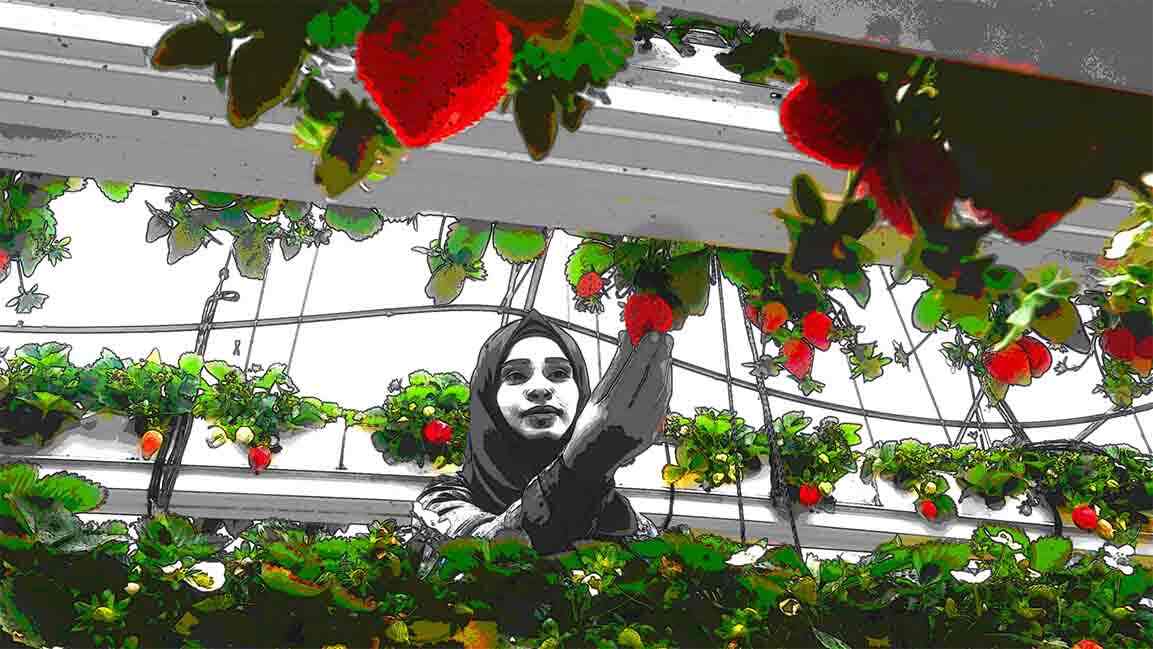- | 10:00 am
Hanging strawberry farms in Gaza are helping small farmers reap big returns
A new type of strawberry farming is increasing productivity and saving water

“For the first time, I was able to grow strawberries in a hanging farm,” says Ali Subuh, a 26-year-old farmer in Beit Lahiya in the northern Gaza Strip. It’s a successful experiment, he adds, indicating it is done for the first time in Gaza. “The fruit quality is better, abundant crops, and cost-efficient.”
A hanging strawberry farm produces three times more than conventional field farming, providing larger quantities in lesser space, which is why many farmers are switching to this type of farming.
Although blockade in the Gaza Strip hindered the arrival of some of the raw materials needed for this experiment, its success opened the door for Gazan farmers to a new type of farming.
Subuh explains that each dunum, which is roughly 1,000 square meters, produces approximately ten tons, while field farming in the same area can produce only three tons. “Also, hanging farms allow us to grow and harvest crops for seven months.”
Growing strawberries is one of the ways Gazan farmers make money between November and June as they try to improve their crops and make profits.
In Subuh’s small plantation, strawberry crops are suspended inside plastic boxes fixed to the greenhouse ceiling, and a drip irrigation system delivers water to the crop.
Hanging strawberry cultivation, Subuh says, is a sustainable solution to water scarcity and limited agricultural lands in the Gaza Strip.
“Additionally, this type of farming provides a high-quality product free of pesticides,” he adds.
ECONOMICALLY VIABLE
Despite the initial high cost of procuring basic equipment needed for the plantation — the cost of setting up a hanging farm in 1,000 square meters is $4,000. Subuh says it is more economically viable for farmers than traditional farming. “A box of strawberries, weighing less than a kilo, is sold between $1-2 dollars in Gaza, but when exported, it is sold for three times more.”
Moreover, one dunum of a hanging farm could accommodate 21,000 seeds. In contrast, he says a conventional farm could accommodate 7,700 seeds, noting that the production saves more than 80% water.
Abd Al-Hadi Badr, a farmer, hopes that his agricultural land, about two thousand square meters in Beit Lahiya, will give him abundant strawberries to export and make a big profit.
“It will give me about 500 kilos of high-quality strawberries weekly,” says the 22-year-old farmer, pointing out that the Israeli military blockade of Palestinian agricultural exports to European markets recently caused heavy losses to farmers.
Now, the ministries of agriculture and economy are working together to cater to the local market’s needs and export the fruit, thus tackling poverty by transforming traditional farming and enriching small-scale farmers.
Adham Al-Basiouni, a spokesman for the Ministry of Economy, said that three tons of the strawberry crop from hanging farms were exported to the UAE and Bahrain recently. This year, he expects strawberry production to reach over 5000 tons.
“The ministry is working hard to make this year’s strawberry season a success and sell the crop to the West Bank, Gulf countries, and international markets.”








































